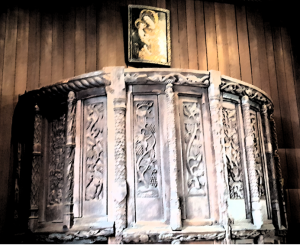
Reading the Gospel of John 6: 35, 41-51
‘Whoever eats of this bread will live forever’
This passage from John 6: 35, 41-51 is included in the revised common lectionary provided by the Vanderbilt Divinity Library. The text is from the NRSV.
Hear a recording of this passage here
Reading the Gospel aloud invites the audience to experience human encounters with the divine as revealed in the Bible. We can leave interpretation and meaning to members of the clergy and other scholars. What we are most interested in as lay readers is the human experience found in the narrative.
First Impressions:
What impresses me most about this reading is how hard it is to talk about these things. Jesus is trying to explain and the audience is trying to understand but they are both struggling. They seem to be talking past each other. How can he now say, “I have come down from heaven”?
Jesus speaks in metaphor. Bread is a metaphor. The metaphor is intended to provide deeper understanding – so that the listening audience may not just understand but experience what Jesus is talking about. Hunger. The insight Jesus is trying to communicate is that we all have a hunger and there is only one way to feed it. We all hunger for life and Jesus is the bread of life. But is the metaphor working here?
The crowd seems confused. They are trying reason among themselves to sort through facts as they understand them. Jesus is the son of Mary and Joseph; how can he come down from heaven? God provided bread, manna from heaven, to Moses and his people. Where is the bread here?
What we have is somewhere between a lesson, a dialogue and a debate. And an apparent failure to communicate.
What the crowed has wanted up until now is signs and proofs. Actions. What Jesus knows they NEED is faith, to believe. Jesus is asking them not to complain, or argue or to try to reason it out. He wants them to understand that they must be drawn by the father… listen first to God… and they will be drawn to Jesus.
For Jesus this is a matter of life and death. We are talking about eternal life and the mortality of human flesh. The audience does not seem to grasp this.
By the end we seem to be at a communication impasse. You can almost see and hear the audience dumbfounded by the end of the passage. How will they respond to what Jesus is telling them?
Text Analysis
Here we are looking for are words or actions that give us clues as to what Jesus and the audience are experiencing at this moment.
This passage is all dialogue. There is virtually no meaningful action taking place.
The words are largely metaphor. Jesus is bread that has come down from heaven? How can that be? He talks of hunger and thirst.
Life. Jesus is not just talking about life. He is talking about what it means to never be hungry and to never die.
“Very truly, I tell you…” Jesus is patiently trying repeatedly to get through to them.
“Everyone who has HEARD and learned from the father…” I love the idea reinforced here of HEARING the word of God.
But it seems like the crowd is not really hearing what Jesus is saying. The words aren’t resonating.
Reading this passage aloud
What experiences do you encounter in this reading?
Confusion. Your audience needs to hear the people trying to work out what Jesus is telling them, in their heads… Trying to make sense of this.
There are clear pauses as Jesus waits to see if they get it.
“Very truly, I tell you….” Jesus makes repeat attempts to get through to them. Be patient. Explain slowly and clearly. Give the words time to sink in.
We are not rushed in this passage.
It seems to me that Jesus has never been more vulnerable than in this passage. He is putting it all out there. Like setting a table before the crowd and inviting them to come to eat… but they are rejecting FOOD. He is saying, come. This is really good food. I want you to take it and eat. Please come…
He is not being pursued here for miracles and healing. He is offering the greatest gift of all: eternal life.
So, set the table for your listeners and see how they react.

